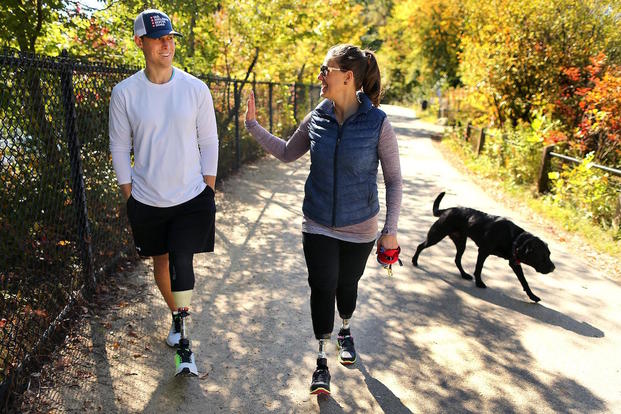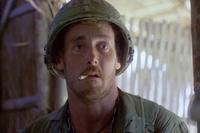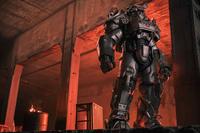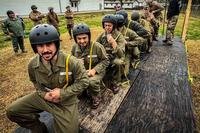On the surface, Patriots Day (now playing in Boston, NYC & LA/opening everywhere on January 13th) is a movie about a fictional cop (played by Mark Wahlberg) and his experiences before, during and after the 2013 Boston Marathon bombing. Where director Peter Berg's outstanding movie excels is in its portrayal of the men and women affected by the bombing and those who worked tirelessly to capture the killers. The thought-provoking characterization of the terrorists is both bracing and chilling.
Two of the most compelling characters in the film are Jessica Kensky and Patrick Downes, a real-life newlywed couple played by Rachel Brosnahan and Christopher O'Shea. While enjoying a day off at the finish line, Jessica and Patrick were severely injured in the explosions. Jessica eventually lost both legs and Patrick lost his left leg.
Both Jessica and Patrick were eventually admitted to Walter Reed Hospital for treatment and both say their time there has changed their lives. Jessica had a career in health care and Patrick was pursuing a doctorate in psychology before the bombing and they have some powerful insights from their experiences.
They met with Military.com during the movie's promotional junket at the Four Seasons in Beverly Hills.

Jessica, Patrick and Rescue, their assistance dog. Rescue sat in on our interview but had no comment.
This must be an unimaginable experience: being here in Beverly Hills in a hotel suite, talking about a movie that talks about your life.
PATRICK DOWNES: It's kind of weird. It's a little uncomfortable because there are so many stories from Boston, there are so many stories of our friends at Walter Reed, that it feels weird to have the attention that we're getting just for our little sliver of a story. You hope that your story is in some way emblematic of everyone else's, but there's also this hesitation because you don’t want it to ever seem selfish or be disrespectful to someone else's experience. So that part for us is kind of strange.
JESSICA KENSKY: I think it's totally just bizarre and surreal but goes along with the rest of our life. Since being part of the Boston Bombing, everything has been flipped upside down. I wake up and decide what feet to put on now and I hear the Reveille trumpets at Walter Reed and I look to my bedside and I see a wheelchair and I think, whose wheelchair is that?
Nothing about my life seems normal or typical or what I was expecting. To be in this beautiful hotel in Beverly Hills seems on par, I guess. We try to do the best we can, to just go along on this ride. There have been a lot of ups and downs and this just happens to be one of the more beautiful, pleasant experiences.

Christopher O'Shea and Rachel Brosnahan portray Patrick and Jessica in "Patriots Day."
After a life-changing event, do you feel you’ve had a mission added to your time here on earth?
PATRICK: I do. I hadn't prepared for it in any way, and yet I think there's a lot that we can draw on: from our family background, from the skills that they taught us, and from the educations that we have in nursing and in mental health. We've had the opportunity to meet all these incredible people. We can take the experience and make it have purpose that’s somehow beneficial to individuals or societies or to the world.
I don’t think we really know what that is just yet. Is that Jess working with trauma patients as a nurse? Is it me trying to figure out the psychological elements that help people recover from these things? Is it learning from the experiences of all of our friends at Walter Reed and advocating to make sure that they get the support that they need?
There are all these things now that feel very purposeful to us because they're so personal at the same time.
%embed2%
A lot of people don’t realize that you were treated at Walter Reed. How did that happen?
JESSICA: It's a really long story as to how we got there, so I'll try to give you the Cliff Notes. My sister did an internship there in their occupational amputee program. We had already been hurt and she was put in touch with one of the occupational therapists who knew I was struggling. They put me in touch then with Army Captain Ferris Butler to be a peer mentor for me. He had very similar injuries to mine and was, at that point, a bilateral below-knee amputee.
After Skyping for several hours, he realized how bad I was doing at the time. I had already lost my left leg and I was doing limb salvage on the right. He had done limb salvage on both sides for many years and knew what a horrendous journey that is. He said to me, “I don’t know how and I'm not a doctor, but I know I need to get you to Walter Reed and I know you need to see” -- and he named off his list of surgeons.
I was so depressed and desperate at the time. I didn’t react much to it. Ferris, my husband, and my father really started advocating to help us get the special designation to be treated there as civilians. This happened at a time in history where they had this amazing body of knowledge at Walter Reed for caring for blast trauma amputees, but their census was lower than it had been in the height of 2007, 2008, 2009. So the knowledge was there and the room was there and we just had to get in there.
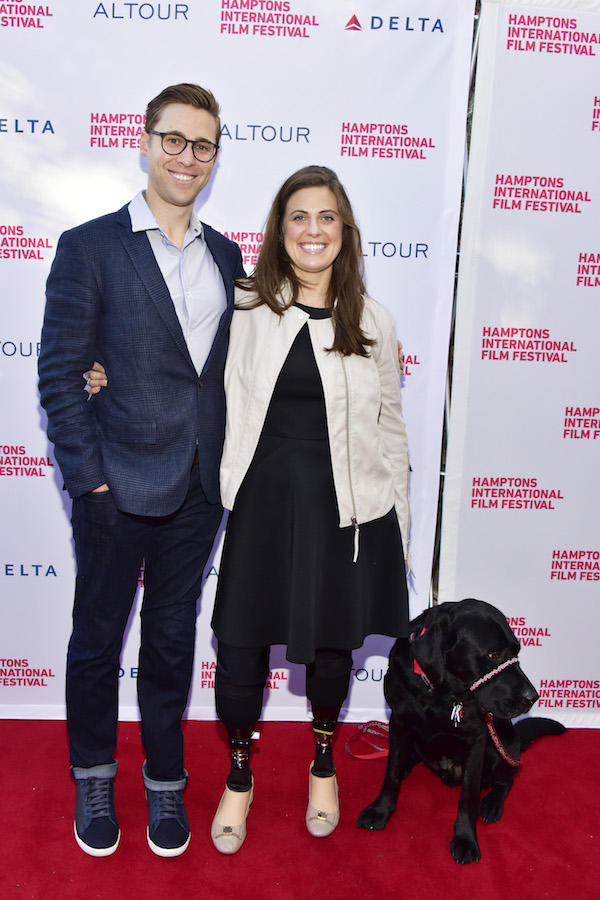
I spent most of my career in oncology. If you have a kind of cancer diagnosis, you want to go to where they see that cancer all the time. To me, this was no different. I had a blast trauma amputation and I needed to go where they saw them all the time, not where they never saw them.
I don’t know how I can say this any better, but being at Walter Reed has changed our lives more than being part of the Boston Marathon bombing. We didn’t grow up in military families, we're not military. I'm embarrassed by how little I understood or thought about military. I went to nursing school at Hopkins. I was literally up the road from Walter Reed. I never even thought about working there as a nurse. Now that’s all I want to do.
It's been an incredible experience in every aspect of our life and we'll be forever grateful for the care we've received, but also the relationships that we've made there that we didn’t expect to make.
%embed1%
Jessica and Patrick's story is portrayed in the HBO documentary "Marathon: The Patriots Day Bombing." You can stream it on HBO or HBO Go or HBO Now. You should do that.
PATRICK: I was really worried about going there because Walter Reed was built very purposefully to care for the men and women who made a conscious decision to put their lives and well-being on the line for the country.
If you promise to go over there and do what we ask you to do, we promise to take care of you when and if you need it. Walter Reed was the country's fulfillment of that promise. It felt and still feels like a very solemn place in that regard. I didn’t want anyone to think that we were being disrespectful of that agreement and that promise.
The men and women there have been incredibly supportive of us. They’ve become dear friends. They’ve let us into their lives, we've let them into ours. We're all very different, we have different political beliefs, we have different childhoods, we were raised in different parts of the country, but we feel this incredible connection to each other.

Rachel Brosnahan and Christopher O'Shea in "Patriots Day."
Of course, there’s a argument to be made that everyone injured in the Boston Marathon bombing is a casualty in the war on terror. Do you ever think about it that way?
PATRICK: We think about it all the time. Some of our Wounded Warrior buddies have told us that they took what happened in Boston so personally because they felt their service in Iraq or Afghanistan was their attempt to keep that away from here. A lot of our buddies who are rehabbing there signed up because of 9/11 and then Boston happens. For them, they're so wrapped up in these experiences of terror that it does feel like a very real threat.
We don’t mean that in like an alarmist sort of way, but just in a realistic way. These things are happening in our country, in other civilized countries. Innocent people are being killed and maimed. We have a real responsibility to figure out why it's happening and perhaps some ways to prevent it. But even more, how are we going to respond to it? The part we can certainly control is how we're going to respond to it.
We've been very active with Senator-elect Duckworth and with Senator Warren to create legislation to improve trauma care around the country, to allow for more access to military hospitals for civilians when space is available and to promote more collaboration between civilian/military medical communities. We have to share this knowledge with each other because people really need it.
JESSICA: We're really careful to say “when medically appropriate” and to never take a bed from a wounded service member.
We're there with our private health insurance. We’re asking for access to the care, but we're not asking for the US government to pay for our care. And they're not.
I do think it is this mutual relationship. Unfortunately, I've needed a lot of surgeries and a ton of rehab. Through all of that, I've provided a lot of experience for new residents and fellows and interns and brand new PT's and PT students as they learn how to take care of these injuries. I’ve been the recipient of this incredible care that a lot of men and women suffered for. We didn’t automatically know how to take care of blast trauma amputees at these military medical centers. It was trial and error by a lot of smart people who were really dedicated to this population, so why lose that institutional knowledge? Sadly, we live in a world where we're clearly going to be doing this again.
The thought of this happening again is so nauseating that it's hard to imagine, but at the same time we're trying to be realistic about it. God forbid it does, how can we make this path smoother and get rid of the red tape so that people can get the treatment they need? We certainly could have benefited from being at Walter Reed sooner and we want to lower the barrier for someone else.
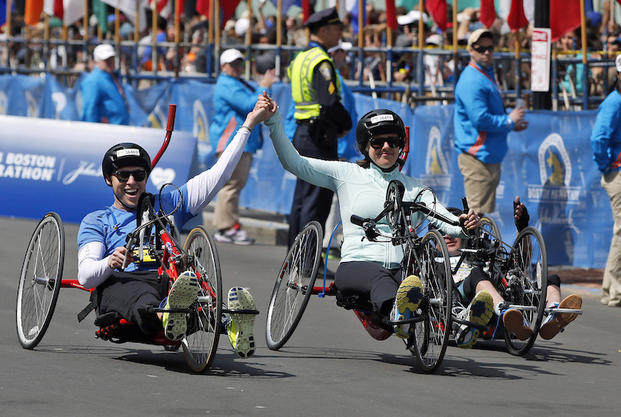
As civilians, did you think much about the War on Terror before this happened to you? Most civilians don’t seem to have much of a connection to the military.
JESSICA: I don’t know if I can answer your question, but I can tell you it's something we think about a lot today. Why is there a movie and why do you know our names and not the names of the men and women at Walter Reed? Maybe there's something about us and our injuries that more Americans can relate to because they feel like they could have been on that city street, their wife, their child, their son could have been on that city street. There's something in the way the country responded when we were hurt.
I've been thinking about it for the last three and a half years: why is there that disconnect? A certain small population of people in this country serve. Everyone else is, frankly, not connected or oblivious to their sacrifice, whether or not they're injured, by the way. Why is that? Why is that disconnect there? What can we do to improve it? Our injuries are so similar to those of men and women who served. Why does the fact of how it happened or where it happened make us more relatable or sympathetic to some people?
Patrick hit on why it can feel really uncomfortable to us. I was selfishly enjoying a day off with my husband. That’s what I was doing when I was blown up. I did not volunteer to serve my country to be in harm's way. So to me there’s no question where the attention should be.
PATRICK: It’s really interesting when you look at Israel and compare their rates of PTSD from Israeli soldiers to American military. They have a far lower PTSD rate. They see some serious shit, as do our men and women, but it makes you wonder if there’s something about their society, their community, that’s more compassionate and understanding of those who served?
JESSICA: Everyone serves in Israel.
PATRICK: There's a stronger appreciation for the sacrifice that they're making and that their families are making. When they're off somewhere and they see really hard stuff, they come back to people who want to hear their story, just like there are people who want to hear our story right now. Somehow that’s therapeutic for them, which allows them to be reminded that they are in a caring and supportive environment.
I think that America has that, but we have a lot of work that we could do to make sure that we don’t just say, “Thank you for your service.” We’ve found that for some of our buddies that really falls flat on them. They're think it's just lip service. “You have no idea what I've been through.” It's not just acknowledging that they’ve served or sacrificed, but it's sitting down with them and saying, “Tell me about your service. I want to learn from you about what's happening in the world because it's important and you're important.” That’s a really powerful message that we have received over and over and over again, but we don’t think that veterans receive it as much as they ought to.
JESSICA: Get to know the service members in your community. Before this experience, I don’t think Patrick and I realized that you could be pro military and anti-war at the same time. I don’t think that we thought those two things lived together, and yet that’s exactly how we feel inside. Whatever we do in the future, we're going to be involved with people with disabilities and we're certainly going to be involved with the military in some capacity. I think we just need to finish, wrap up our own recoveries before we can continue to give back.
